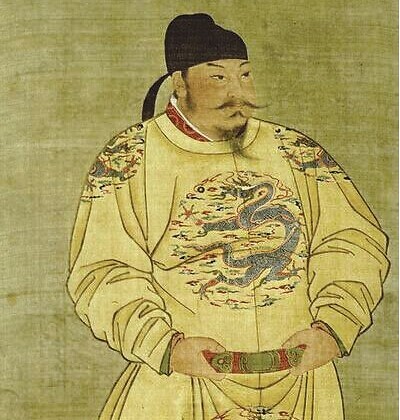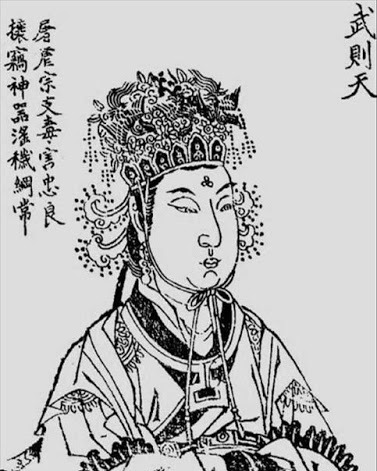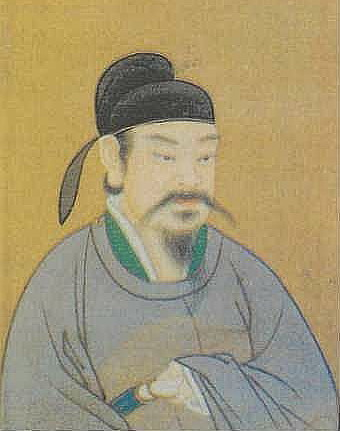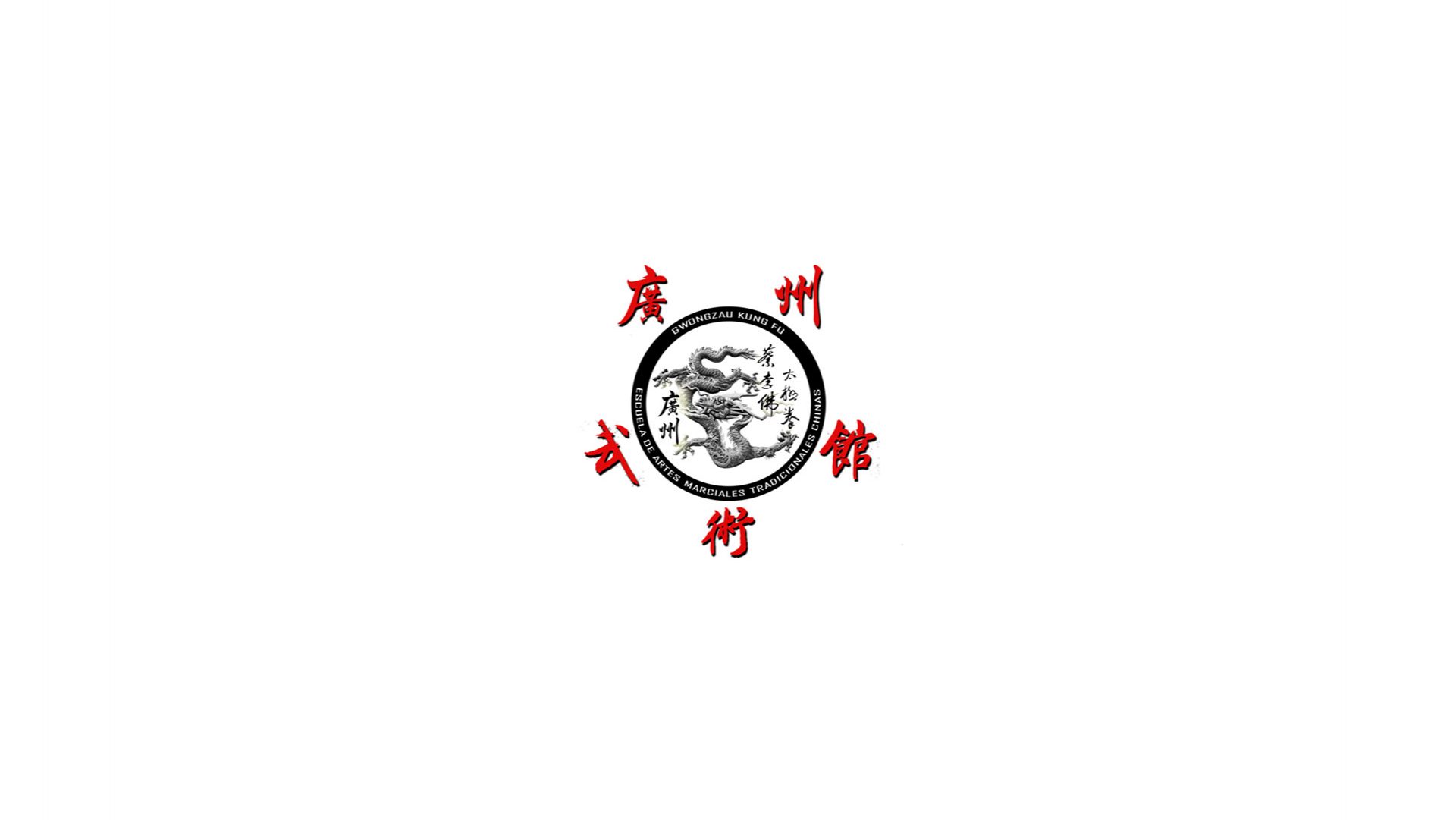Wǔ Zétiān 武則天 (625-705) is the only woman in Chinese history to have held the imperial throne. Although other women, some tremendously influential, such as Cíxǐ 慈禧, held the position of regent as empress dowager (皇太后 húangtàihòu)*, none of them truly took up the throne of the Son of Heaven (天子 Tiānzǐ).
Coming from a family of aristocrats from Shānxī 山西 province, she became part of the imperial harem when she was fourteen, under the mandate of Emperor Tàizōng 太宗 of the Táng dynasty 唐朝, as a low-ranking concubine.

Emperor Tàizōng 太宗.
It is unclear what the young woman's fate was when, in 649, Emperor Tàizōng passed away. Historians at the time tell us that she was sent to a Buddhist convent until the new emperor, Gāozōng 高宗, was ensued of her beauty and claimed her as a concubine, but this version is now called into question. It is possible that at that time, Wǔ Zétiān already had an intimate relationship with Gāozōng, and that this facilitated her incorporation into the harem of the new sovereign. The truth is that she was a concubine of both emperors, father and son, and this fact already provoked criticism from her contemporaries (as well as future historians), for going against Confucian morality.
Wǔ Zétiān gradually gained ground in the court, becoming the emperor's favourite, until in 654 she gave birth to a girl who was murdered. The imperial concubine accused Empress Wáng Huánghòu 王皇后 of the crime and, after making her fall into disgrace, was named Empress Consort herself. Some sources at the time claim that it was her who killed her own daughter, to use the baby's death to replace Empress Wáng, who she allegedly tortured to death. However, this version is likely to be based on rumors spread by its political enemies. It is possible that Empress Wáng, who had no children of her own, actually killed Wǔ's daughter (who had previously had two other children) moved by envy. Be that as it may, Wǔ Zétiān was undoubtedly a woman of great ambition and thirst for power, and managed to maneuver against Wáng to take her place.
In 656, Wǔ got the emperor to appoint his first son with her, Lǐ Hóng 李弘, as heir to the throne, above others of his previous sons he had had with another consort. A few years later, in 660, Emperor Gāozōng became ill and Empress Wǔ became the de facto ruler. From this position, she began a process of eliminating his political enemies in court, replacing them in their positions with officials loyal to her. Her enemies accuse her of countless crimes, even of having been poisoning the emperor, but it seems true that she was a more capable ruler than the Gāozōng.
Over the next few years, Wǔ gained tremendous power in the court, often appearing with the emperor and even attending to the court herself when he was indisposed, and in any case making the most important decisions.

Wǔ Zétiān 武則天
In 675, the relationship between the Empress Consort and her son the crown prince had deteriorated. That year, Prince Lǐ Hóng died suddenly. Again, historians accuse Wǔ Zétiān of poisoning her son.
Wǔ's second son, Lǐ Xián 李賢, replaced the former as heir to the throne. But he also ended up in disgrace, accused of treason and exiled, and again replaced by another of his brothers, Lǐ Xiǎn 李顯 or Lǐ Zhé 李哲.
In 683, Emperor Gāozōng died, and Prince Lǐ Zhé succeeded him as emperor by the name of Táng Zhōngzōng 唐中宗. His reign would last only a month and a half**. Empress Wǔ, now empress dowager, but retaining royal power as regent, deposed Zhōngzōng, whose decisions did not conform to her will, and installed on the throne her youngest son, Lǐ Dàn 李旦, who assumed the new name of Ruìzōng 睿宗.

Emperor Ruìzōng 睿宗.
Ruìzōng was a puppet in the hands of Empress Wǔ, who no longer bothered to keep appearances; dictated to the emperor the orders he had to issue, and the emperor was not authorized to meet with court officials.
In Jiāngsū 江苏 province, General Lǐ Jìngyè 李敬業 got the support of the local population and rose up in arms, but he did not take his chance and was defeated and killed by a general of Empress Wǔ. Another attempt at rebellion took place in 688, when the Empress summoned numerous princes of the imperial family to a ceremony to offer sacrifices to the gods. Fearing a trap to end their lives, they planned to rebel, but failed to have their forces ready at the same time, and the Empress apprehended them and forced them to commit suicide.
Finally, in 690, Wǔ Zétiān decided to take the step that was missing to become the reigning Empress, and forced Ruìzōng to abdicate on her behalf. Never in China's history had a woman assumed (or did it later) the title of huángdì 黃帝, "emperor", and tradition did not allow a woman to ascend to the throne. But Wǔ had paved the way by eliminating his opponents, and found legitimacy and support for his reign in the Buddhist clergy.
She assumed the name Wǔ Zhào 武曌, for which she invented a new character***, and proclaimed the Zhōu 周 dynasty, also called Wǔ Zhōu 武周 or Southern Zhōu 南周, to differentiate it from the ancient Zhōu dynasty 周 (1046-256 BC), which she attempted to evoke.
The now empress regnant placed Lǐ Dàn as heir to the throne, although for a while she seemed to favour her nephew Wǔ Chéngsì 武承嗣, who had supported her on her ascension to the throne.
On the other hand, she began a successful military campaign to take back some territories, in present-day Xīnjiāng 新疆, which had fallen under the control of the Tibetan Empire. In 696 she sent a new army against the Tibetan Empire, but this time the campaign ended in defeat.
That same year she faced other threats: the rebellion of two khitan (契丹 qìdān) chiefs and the attacks of the Second Turkic Khaganate (突厥汗国 tūjué hánguó). The armies sent by Wǔ Zétiān were unsuccessful and the Empress had to sign peace with the Khaganate, that eventually defeated the khitan troops.
In 698, some officials who were close to the Empress convinced her to install his second son, Lǐ Xiǎn, former emperor Zhōngzōng, as heir to the throne, taking the new name Wǔ Xiǎn 武顯.
In 705, with Wǔ Zétiān old and sick, some generals surrounded her residence, killing two of her closest chancellors, and forced the empress to abdicate in favor of Lǐ Xiǎn. On February 23, Lǐ Xiǎn (Zhōngzōng) again assumed the throne, restoring the Táng dynasty. Wǔ Zétiān was awarded honorary titles but remained in custody, dying on December 16 of that same year. Her son Emperor Zhōngzōng had her buried next with Gāozōng near Cháng'ān 長安.
The most important pillar on which Wǔ Zétiān based her legitimacy as reigning empress was the Buddhist clergy. Gāozōng had already turned Buddhism into the official religion of the state, to the detriment of Taoism, a decision he possibly made under the influence of Empress Wǔ. On the other hand, some Buddhist texts were manipulated by a monk named Xuē Huáiyì 薛懷義, with whom the Empress had an affair, to provide legitimacy to her reign. One of these texts, Commentary on the Meaning of the Prophecy about the Divine Emperor in the Sutra of the Great Cloud (大雲經神皇授記義疏 dà yún jīng shén huáng shòu jì yì shū), identified the empress as the incarnation of Maitreya Buddha (彌勒菩薩 mí lè pú sà), born to rule on the world of humans. This same text was distributed in Buddhist monasteries throughout China prior to the ascension of Wǔ Zétiān to the throne.
Another pillar of her reign was a secret police that informed and eliminated all her opponents.
Wǔ Zétiān is undoubtedly one of the most hated women in Chinese history, and her reign has been branded cruel and bloody by many historians, who ignored what her male counterparts did. Her rise was seen as a violation of Confucian norms and tradition, according to which a woman could not access power. However, most historians also recognize their ability to govern, and especially to judge and employ talented men well.
During her reign, she cared for the education, well-being and religious status of women, as well as their access to public office, and her government laid the foundations for the future golden era of the Táng dynasty.
Notes:
* It is necessary to note here that the title of "empress dowager" was given to the mother of the reigning emperor, so it was not a sovereign position.
** Zhōngzōng would reign again between 705 and 710.
*** The word zhào 曌 is unique in Chinese and has no other meaning. It was invented by Wǔ Zétiān to have a unique name.
Sources:
- Buddhism, Diplomacy and Trade, The Realignment of Sino-Indian Relations, 600-1400, Tansen Sen, 2003, Association for Asian Studies, Inc.
- Female Rule in Chinese and English Literary Utopias, Qingyun Wu, 1995, Syracuse University Press.
